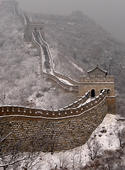For the first two-thirds of the twentieth century, American liberals distinguished themselves from conservatives by what Lionel Trilling called “a spiritual orthodoxy of belief in progress.” Liberalism placed its hopes in human perfectibility. Regarding human nature as essentially both beneficent and malleable, liberals, like their socialist cousins, argued that with the aid of science and given the proper social and economic conditions, humanity could free itself from its cramped carapace of greed and distrust and enter a realm of true freedom and happiness. read more »
America's 21st-Century Business Model
Current attitudes aren't too kind to the old American way of doing business. In our globalized economy, the most enthusiastically touted approaches are those adopted by centralized, state-dominated economies such as China, Brazil and Russia as well as--somewhat less oppressively--those of the major E.U. states.
Yet the U.S. may well be constructing the best sustainable business model for the 21st Century. It is an approach built on the country's greatest enduring strength--an innovative business culture driven increasingly by a diverse pool of immigrants. read more »
What’s Behind China’s Big Traffic Jam
The world press has been fixated on the "Beijing" traffic jam that lasted for nearly two weeks. There is a potential lesson here for the United States, which is that if traffic is allowed to far exceed roadway capacity, unprecedented traffic jams can occur.
The Inner Mongolia Traffic Jam: First we need to understand that this was not a "Beijing" traffic jam at all,or even on the outskirts of Beijing. The traffic jam came no closer to Beijing than 150 miles (250 kilometers) away, beyond the border of the city/province of Beijing, through the province of Hebei and nearly to the border of Inner Mongolia. read more »
Australia 2010: Unstable Politics in a Prosperous Country
2010 has been something of an annus mirabilis in Australian politics. On 24 June a prime minister was dumped before facing the voters a second time. This was the first time ever for such an early exit. Then the election on 22 August produced a “hung parliament”, an outcome not seen since the 1940s. Having fallen short of enough seats to form government, the major parties are scrambling for the support of four independents and one Green in the House of Representatives. read more »
Summer in the Hamptons: UnReal Estate
If you are looking for a place where you can, in your day dreams, ride out the recession, might I suggest one of the Hamptons? These are the celebrity-drenched villages that stretch for thirty miles across the sand dunes and potato fields of Long Island’s South Fork, which ends at Montauk Point and its lighthouse.
Why the Hamptons for a depression-era exile? For starters, if you’re a seller, the Hamptons remain Paradise. Fishermen’s cottages start at $1 million, oceanfront property goes for about $7 million an acre, and the street value of guacamole rivals that of cocaine. read more »
Has America Caught the British Disease?
As the economy stalls, analysts are worrying that the United States might repeat the experience of Japan’s “lost decade” (actually, two lost decades). Is America turning Japanese? We should be more worried about the prospect that America is turning British.
The United Kingdom went from creating the first industrial economy and establishing a global empire to lagging Italy by the 1970s. The neoliberal reforms of Thatcher and Blair, intended to modernize the economy, merely replaced a rotting manufacturing economy with an unstable rentier economy centered in the City of London. With a zombie economy characterized by industrial wastelands, off-limits aristocratic landholdings, tourist kitsch and a financial sector that choked on its own excesses, Tony Blair’s “Cool Britannia” looks more like “Ghoul Britannia.” read more »
The Housing Bubble: The Economists Should Have Known
Paul Krugman got it right. But it should not have taken a Nobel Laureate to note that the emperor's nakedness with respect to the connection between the housing bubble and more restrictive land use regulation. read more »
The China Syndrome
China's ascension to the world's second-largest economy, surpassing Japan, has led to predictions that it will inevitably snatch the No. 1 spot from the United States. Nomura Securities envisions China surpassing the U.S.' total GDP in little more than a decade. And economist Robert Fogel predicts that by 2050 China's economy will account for 40% of the world's GDP, with the U.S.' share shrinking to a measly 14%.
Americans indeed should worry about the prospect of slipping status, but the idée fixe about China's inevitable hegemony--like Japan's two decades ago--could prove greatly exaggerated. Countries generally do not experience hyper-growth--the starting point for many predictions--for long. Eventually costs rise, internal pressures grow and natural limitations brake and can even throw the economy into reverse. read more »
The Disappearance of the Next Middle Class
Every week we read that yet another major housing project has been turned down by the Courts here in New Zealand because of the need to protect "rural character" or "natural landscapes". This may well have profound short and long-term consequences for the future of our middle class, as it does for the same class in countries around the advanced world.
Every week a multitude of smaller developers abandon their projects because Councils’ compliance costs and development contributions make the projects unviable – even if the land were free. And it’s not. read more »
China's Sliver of a Housing Bubble
Few finance issues have received such a wide range of opinions among financial experts than the "housing bubble" in China. This is an issue of international importance because what happens in what is now the world’s 2nd largest economy affects the rest of the world. read more »
- Login to post comments





















